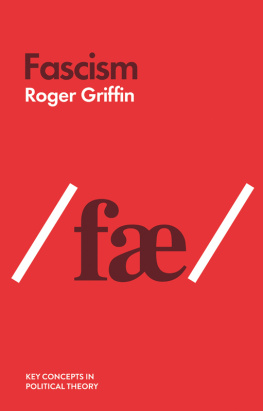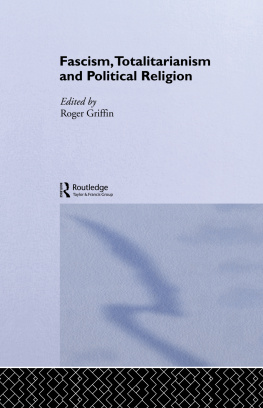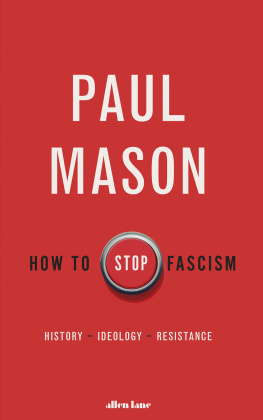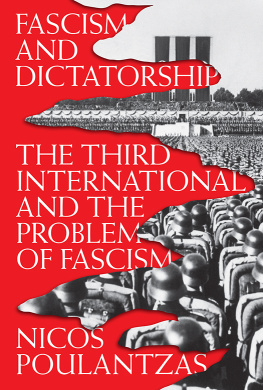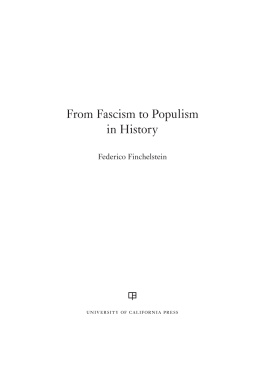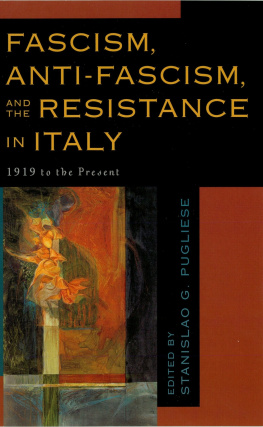
Series Title
Key Concepts in Political Theory
- Charles Jones and Richard Vernon, Patriotism
- Roger Griffin, Fascism
Copyright page
Copyright Roger Griffin 2018
The right of Roger Griffin to be identified as Author of this Work has been asserted in accordance with the UK Copyright, Designs and Patents Act 1988.
First published in 2018 by Polity Press
Polity Press
65 Bridge Street
Cambridge CB2 1UR, UK
Polity Press
101 Station Landing
Suite 300
Medford, MA 02155, USA
All rights reserved. Except for the quotation of short passages for the purpose of criticism and review, no part of this publication may be reproduced, stored in a retrieval system or transmitted, in any form or by any means, electronic, mechanical, photocopying, recording or otherwise, without the prior permission of the publisher.
ISBN-13: 978-1-5095-2067-1
ISBN-13: 978-1-5095-2068-8 (pb)
A catalogue record for this book is available from the British Library.
Library of Congress Cataloging-in-Publication Data
Names: Griffin, Roger, 1948- author.
Title: Fascism / Roger Griffin.
Description: Medford, Massachusetts : Polity Press, 2018. | Series: Key Concepts in Political Theory | Includes bibliographical references and index.
Identifiers: LCCN 2017040401 (print) | LCCN 2017047571 (ebook) | ISBN 9781509520718 (Epub) | ISBN 9781509520671 (Hardback) | ISBN 9781509520688 (Paperback)
Subjects: LCSH: Fascism.
Classification: LCC JC481 (ebook) | LCC JC481 .G694 2018 (print) | DDC 320.53/3--dc23
LC record available at https://lccn.loc.gov/2017040401
Typeset in 10.5 on 12 pt Sabon
by Fakenham Prepress Solutions, Fakenham, Norfolk NR21 8NN
Printed and bound in Great Britain by CPI Group (UK) Ltd, Croydon
The publisher has used its best endeavours to ensure that the URLs for external websites referred to in this book are correct and active at the time of going to press. However, the publisher has no responsibility for the websites and can make no guarantee that a site will remain live or that the content is or will remain appropriate.
Every effort has been made to trace all copyright holders, but if any have been inadvertently overlooked the publisher will be pleased to include any necessary credits in any subsequent reprint or edition.
For further information on Polity, visit our website: politybooks.com
Acknowledgements
This brief, but hopefully substantial, introduction to fascist studies owes an obvious debt to a small group of academics, speaking a wide variety of mother tongues, who pioneered the application of methodological empathy to understanding the nature of fascism. Their works became available between the 1960s and when I started my own research into fascism in 1985 and convinced me that the premises on which I was working were not totally aberrant (despite the enduring scepticism of some eminent historians). It is also indebted to a larger number of colleagues who approached fascist studies in a way either influenced by or convergent with my theory of palingenetic ultranationalism in a critical but collaborative and generous-hearted spirit. The resulting synergies enabled genuine and rapid progress to be made away from a sustained period dominated by a curious methodological naivety and numerous idiosyncratic theories of fascism of minimal value to practising historians and political scientists.
It is a happy coincidence that the publication of this guide to fascism as a political theory coincides with the formation of the International Association for Comparative Fascist Studies (COMFAS) at the Central European University in Budapest, a fitting symbol of the way what used to be little more than a loose collection of arbitrary, almost amateur guesses about how to write about fascism has grown into a dynamic and cohesive sub-discipline. All those academics cited approvingly in this volume are implicitly acknowledged here, but several helped considerably to improve the first draft, notably my editor at Polity, George Owers (who showed remarkable patience as the project became more protracted and had a decisive impact on the final shape that it took), and my fellow adventurers in research into fascism and neo-fascism, Aristotle Kallis, Paul Jackson, Anton Shekhovtsov, David Roberts and Jakub Drabik.
What sparked my interest in fascism was the synchronicity of Mariella Demartini coming into my life and, with her, a magic portal through which to enter Italian culture, history, and language, just at a time when I was teaching a course on theories of fascism with my head of department, Dr Robert Murray, at what was destined to become Oxford Brookes University. He had survived as a soldier fighting with the Anglo-American forces in Italy to defeat fascism, and he now wanted to understand as an academic just what it was he had been fighting and fighting for. It is to Mariella and Robert that this book is dedicated.
Campomorone and Oxford, August 2017
Introduction: Why Fascism is a Key Concept
What then is fascism?
Some sixteen centuries ago, St Augustine of Hippo wrote in Book XI of his Confessions: What then is time? If no one asks me, I know what it is. If I wish to explain it to him who asks, I do not know. A similar problem is posed by fascism. Most people who have been educated in the West instinctively know what fascism is until they have to explain it to someone else, at which point the attempted definition tends to get increasingly convoluted and incoherent (an assertion that could be tested as a seminar exercise!). The rationale for the addition of this title to Politys Key Concepts in Political Theory series is that not only is it impossible simply to state what fascism is but, a century after the word came into being to refer to a new Italian political movement and programme, its definition as a term of political and historical analysis is still bewilderingly varied and hotly debated. Hence the need for this beginners guide, conceived for those studying at any level in the historical or political sciences who have reached the point where they have been recommended (or, even better, spontaneously feel the need for) a synoptic account of fascist studies, a relatively compact and accessible definition of fascism, and a brief overview of its main features, history and evolution when this definition is applied to actual policies, movements and events.
Study guides in the humanities run the risk of being frustratingly abstract and opaque, reminiscent of an instruction manual for assembling a flat-pack table tennis table which makes sense only once the table has been assembled, leaving some mysterious nuts, bolts and washers left over (I speak from experience). Nevertheless, I hope that what follows will demonstrate that, while fascism may be a frustratingly elusive topic when it comes to identifying the definitional features that distinguish it from other forms of far-right movements and regimes, perhaps for that very reason it can also be a highly absorbing and fulfilling one to study. In the first place, fascism supplies an outstanding example of the sound academic principle that, at an advanced level, no one can study or write the history of any aspect of a major topic in the human sciences effectively without first clarifying its conceptual contours and establishing a working definition with due regard to how the discipline has approached it in the past. Second, if the core argument of this volume is accepted, a fascinating narrative emerges of how fascism, since its inauspicious beginnings in March 1919 as a new but insignificant political force launched by a motley assembly of Italian war veterans, grew in the interwar period into a devastating world-historical force and continues to impact on contemporary history in a number of ways, despite the radical decline in its support base and potency since 1945. Finally, even if you disagree with the thesis put forward here, it should at least help you to locate where you stand in the ongoing debate about fascism, to formulate what you find unconvincing in what has become the dominant school of thought within comparative fascist studies, and to present your own take on fascism more confidently within the context of an essay project or formal programme of studies.
Next page
